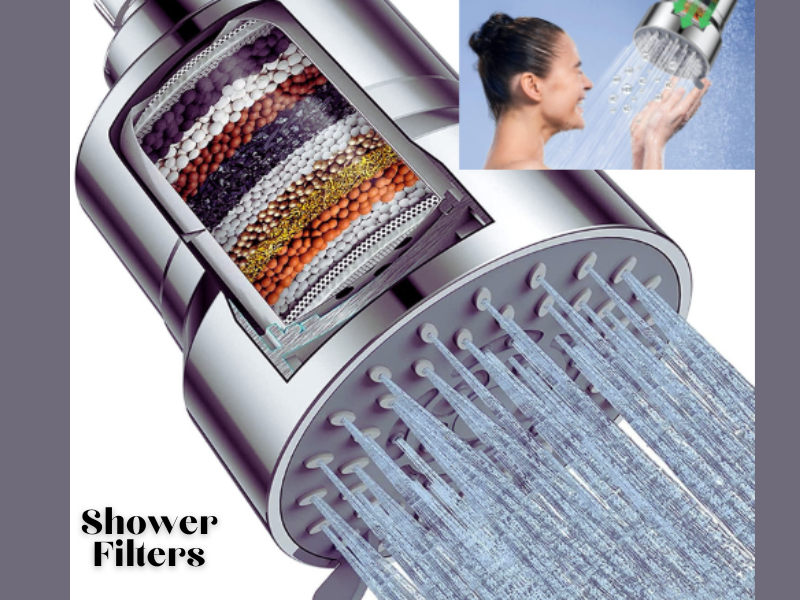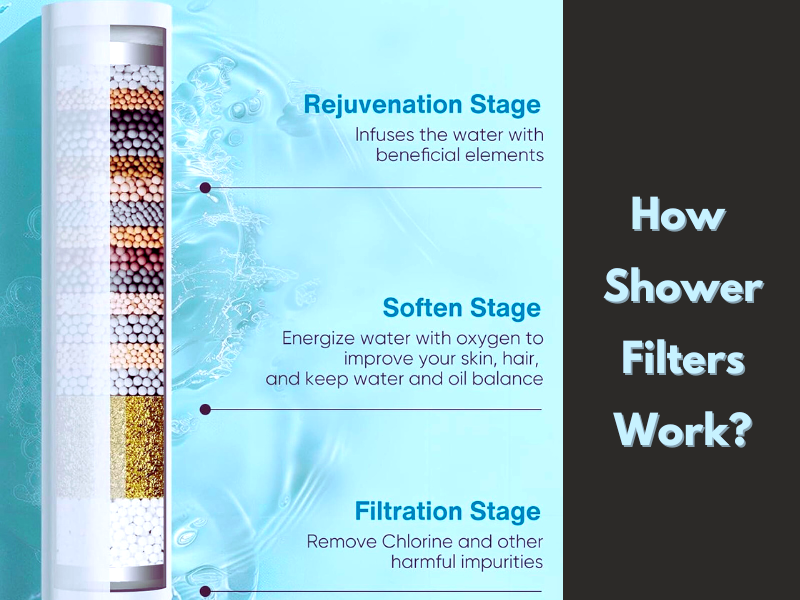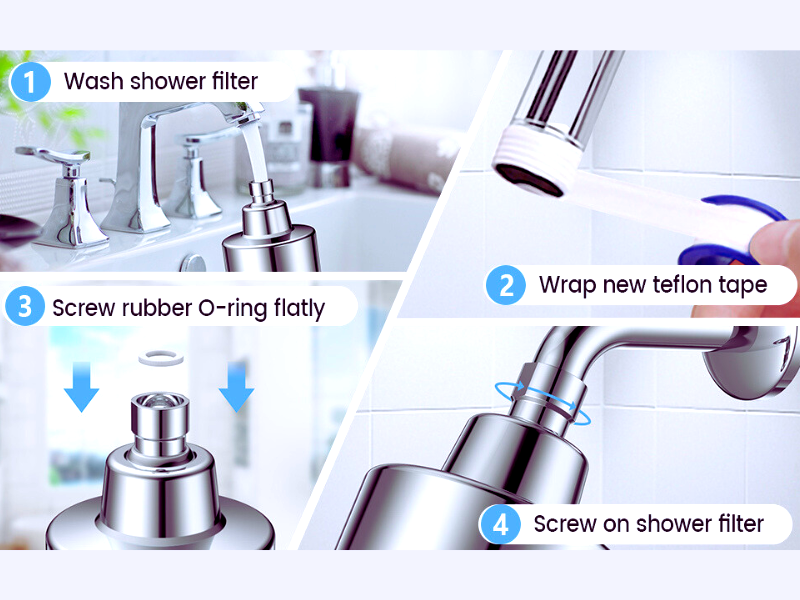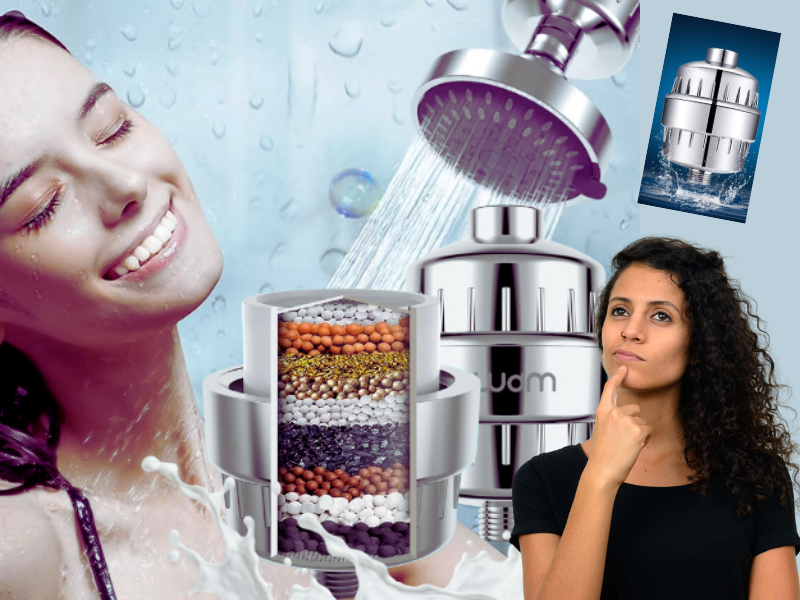Key Takeaways:
- Shower filters remove harmful chemicals and impurities from your shower water and skin and hair health.
- Activated carbon filters and other filter media are used in shower filters to remove chlorine, heavy metals, and other contaminants.
- Improve water quality, reduce skin irritation, and keep natural oils in your skin and hair.
Have you ever wondered why your skin feels dry and itchy after a hot shower? Chlorine and other chemicals in your shower water strip your skin of its natural oils and leave you dry and irritated, resulting in itchy skin, rashes, and acne. Or why your hair feels brittle and lifeless? The culprit might be in your shower water. Enter the world of shower filters—a simple solution to transform your shower experience. But what’s the point of a shower filter, and how can it help you? Let’s get into it.

Understanding of Shower Filters
Shower filters are devices attached to your shower head or installed in the shower line to remove impurities from the water. A shower head filter improves personal wellness by filtering out chlorine and heavy metals from the shower water for your skin and hair. Using a shower filter means you get cleaner, healthier water every time you shower.
Most shower filters use different filter media such as activated carbon filters, kinetic degradation fluxion (KDF), and vitamin C filters. These materials remove chlorine, heavy metals, and other impurities from the water for the best shower experience.
What’s a Shower Filter?
A shower filter is a device in your shower that treats the water before it touches your skin and hair. These filters remove impurities and contaminants such as chlorine, chloramines, and heavy metals from the shower water. By doing so, shower filters reduce skin irritation, prevent hair damage, and improve overall skin and hair health. They’re a must-have for anyone who wants to improve their shower experience and protect their skin and hair from untreated water.
How Shower Filters Work

Shower filters work by passing the water through different layers of filter media. Each layer targets specific impurities, so your water is as clean as possible. For example, activated carbon filters are great at removing chlorine and other organic compounds, and KDF filters remove heavy metals and bacteria.
When chlorinated water passes through a shower filter, the chlorine is absorbed by the filter media or converted into a less harmful substance. This reduces chlorine exposure, which can cause skin irritation, dry skin, and other health issues. Shower filters remove chlorine and other harmful chemicals and improve water quality. However, they don’t soften water like water softeners do, which work differently. Also, shower filters help maintain the natural oils in your skin and hair so they don’t become dry and brittle.
Types of Filtration Methods
Shower filters use different filtration methods to clean the water, each with its own advantages:
- Activated Carbon: This method uses activated carbon to remove chlorine, lead, and volatile organic compounds (VOCs) from the water. Activated carbon is known for its high absorption capacity, which is why it’s popular in many shower filters.
- KDF (Kinetic Degradation Fluxion): KDF filters use a granular zinc alloy to remove chlorine, lead, and heavy metals from the water. This method reduces bacteria and algae growth, making the water cleaner.
- Vitamin C: Vitamin C filters use ascorbic acid to neutralize chlorine and chloramines in the water. This method is gentle on the skin and hair, so it’s perfect for those with sensitive skin or dyed hair.
- Reverse Osmosis: This advanced filtration method uses a semi-permeable membrane to remove a wide range of impurities, including dissolved solids, bacteria, and viruses. Although not common in shower filters because of its complexity, reverse osmosis is thorough in purification.
Not all shower filters use the same filtration method; some may combine different methods to achieve better results. When choosing a shower filter, consider the impurities in your shower water and choose a filter that can remove those impurities.
Benefits of Using Shower Filters

One of the benefits of using shower filters is skin and hair health. Chlorine and other contaminants in tap water strip away the natural oils that protect your skin and hair, making them dry, irritated, and other issues. Using a shower filter, you can maintain those natural oils so your skin and hair are healthy and hydrated. Warm water and steam during hot showers open up skin pores, so it’s important to filter shower water to remove harmful chemicals like chlorine and chloramines.
Another benefit of shower filters is they can reduce the harsh chemical smell of chlorinated water. This makes your shower experience more pleasant. Also, shower filters can prevent soap scum buildup on your bathroom fixtures, making cleaning easier and more efficient.
Types of Shower Filters
There are several types of shower filters available in the market, each with its features and benefits. Some of the most common types are activated carbon filters, KDF filters, and vitamin C filters. Activated carbon filters are great at removing chlorine and other organic compounds, and KDF filters remove heavy metals and bacteria. Traditional shower filters may not remove chloramines from water because of insufficient contact time with the filtration media.
Vitamin C filters, on the other hand, use water-soluble ascorbic acid to neutralize chlorine and other harmful chemicals. These filters are popular among people with sensitive skin or dyed hair as they can reduce irritation and maintain hair color. When choosing a shower filter, consider your needs and preferences to find the best one.
Installation and Maintenance

Installing a shower filter is a simple process that doesn’t require professional help. Most filters are designed to fit standard shower heads and can be attached by following the manufacturer’s instructions. Many shower filter companies produce easy-to-install filters with advanced technology to neutralize harmful substances and low-pressure models for homes with low water pressure. However, ensure the filter is compatible with your shower head and water pressure to avoid any issues.
Maintenance is also important to ensure your shower filter continues to work well. Depending on the water quality and usage, most filter cartridges need to be replaced every 6 months to a year. Regularly checking and replacing the filter cartridges can maintain optimal water flow and filtration performance.
Water Pressure
One concern with shower filters is that they may reduce water pressure. While it’s true that some filters can reduce water pressure, many modern shower filters are designed to minimize this issue. By choosing a high-quality filter that is compatible with your pressure range, you can enjoy filtered water without sacrificing water pressure. Shower filters ensure shower water flows impurity-free, thus creating a gentler and less irritating shower experience.
Also, make sure to clean and maintain your shower filter to prevent clogs and ensure optimal performance. If you notice a big drop in water pressure, it’s time to replace the filter cartridge or clean the filter to remove any buildup.
Environmental Benefits
Using a shower filter can also have environmental benefits. Reducing chlorine and other harmful chemicals in your shower water can help protect aquatic ecosystems and reduce your home's ecological footprint. Also, shower filters can reduce the need for harsh cleaning products as they can prevent soap scum buildup on your bathroom fixtures. A shower water filter can also be a simple DIY solution to dry skin and chlorine odor, an easy fix to improve your shower experience.
Shower filters can also contribute to water conservation by improving water quality and reducing excessive rinsing. By using a shower filter, you can have a cleaner and healthier shower experience and do your part for the environment.
Choosing the Right Shower Filter

When choosing a shower filter, consider water quality, filtration media, and compatibility with your shower head. Some filters are better for specific contaminants, so it's important to choose a filter that addresses your needs. For example, if your water has high chlorine, an activated carbon filter or vitamin C filter may be the best option.
Also, consider the filter’s lifespan and maintenance. Some filters need to be replaced more often than others, so it's important to choose a filter that fits your lifestyle and budget. By considering these factors, you can find the right shower filter for you.
Summary
Shower filters are must-have tools to improve water quality and protect skin and hair from harsh chemicals and contaminants. Different filtration media, such as activated carbon filters, KDF filters, and vitamin C filters, can remove chlorine, heavy metals, and other impurities from shower water. This means healthier skin and hair, less irritation, and a better shower experience.
Shower head filters remove harmful substances like chlorine and heavy metals, thus creating cleaner showers and healthier skin and hair.
Keep up with the latest water filter tips and offers, and subscribe to our newsletter today!
FAQ
How often should I replace my shower filter cartridge?
Depending on water quality and usage, most shower filter cartridges must be replaced every six months to a year. Regularly checking and replacing the filter cartridges can maintain optimal water flow and filtration performance.
Can shower filters reduce water pressure?
Some shower filters may reduce water pressure, but many modern filters are designed to minimize this issue. Choose a high-quality filter that is compatible with your pressure range, and you can enjoy filtered water without sacrificing water pressure.
Are shower filters good for sensitive skin?
Yes, shower filters are good for sensitive skin. They remove chlorine and other harsh chemicals from the water, helping reduce skin irritation and retaining natural oils, making your skin healthy and moisturized.








